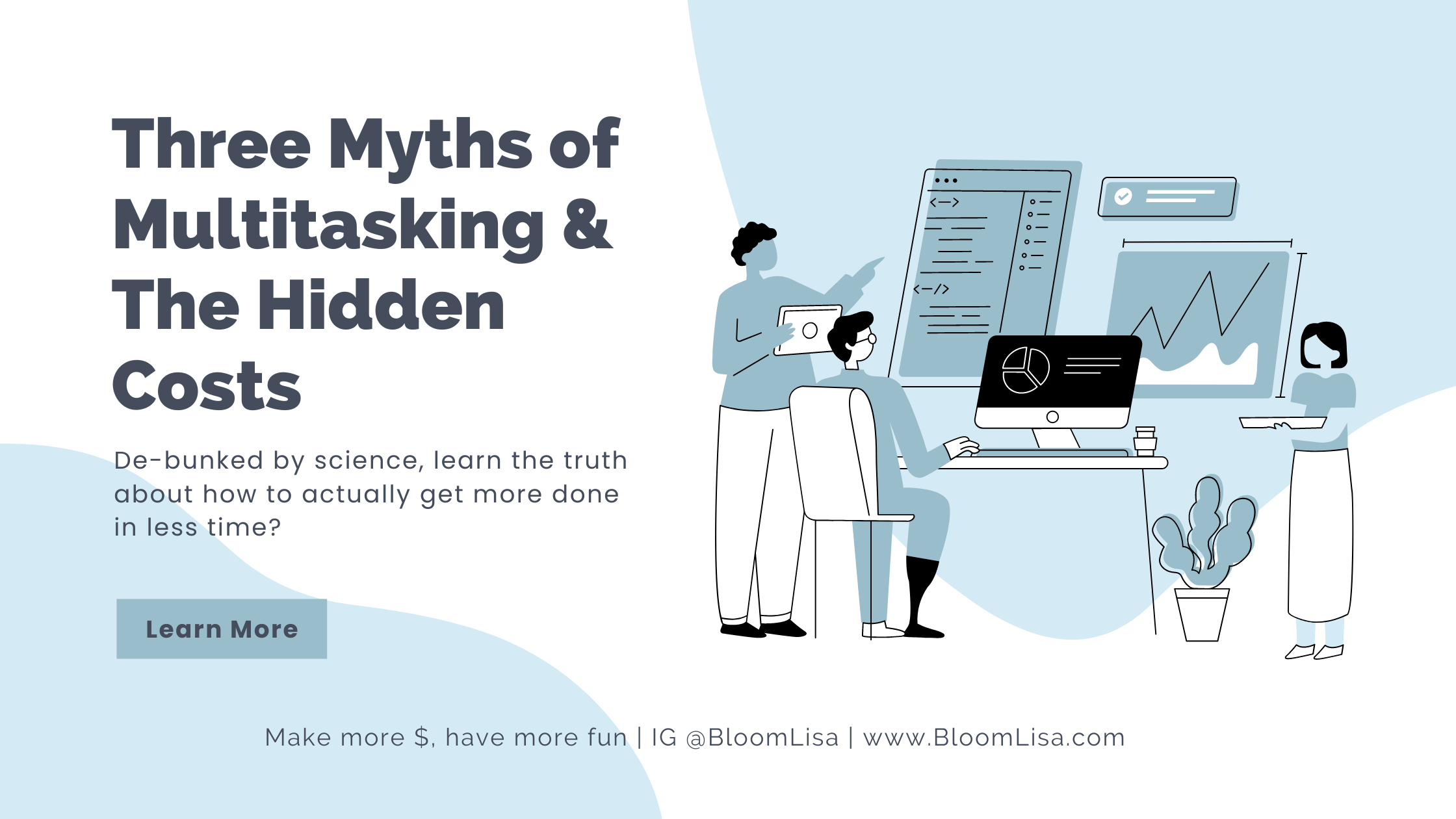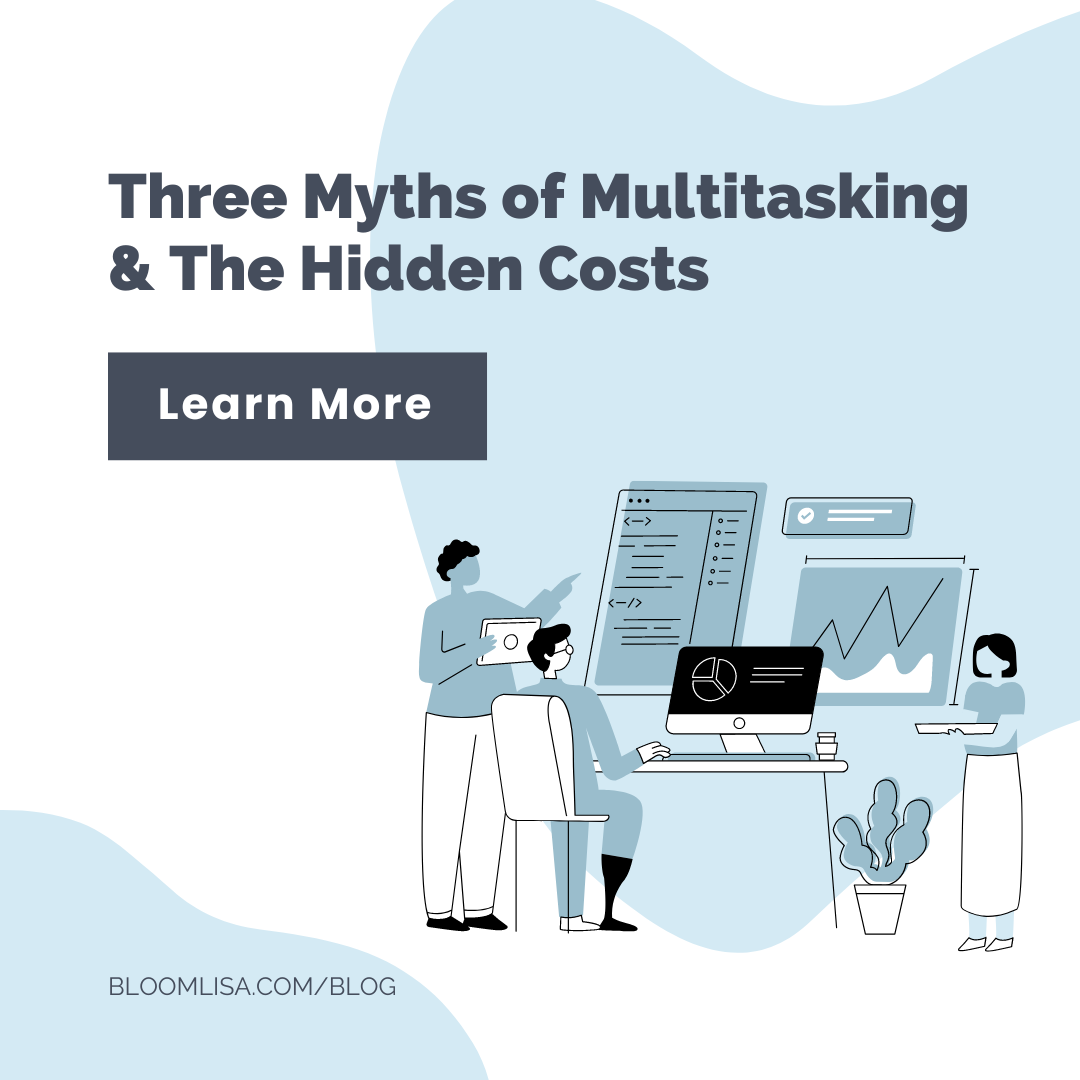
Three Myths Multitasking & Their Hidden Costs
Multitasking has taken the modern world by storm and is worn as a badge of honour by high performers, students, leaders and moms yet, what actually is multi-tasking?
The dictionary definition of multi-tasking is:
/ˌməltēˈtaskiNG/
noun
- the performance of more than one task at the same time. Used in a sentence: Parenting skills such as multitasking and concentrating amid distractions are easily transferable to the workplace.
- the execution by a computer of more than one program or task simultaneously. Used in a sentence: Multitasking didn’t slow down the smartphone at any point.
Myth #1- Multitasking is more productive
You can’t physically do more than one thing at once, unless one of the things you’re doing is automatic, like driving and holding a conversation.
Two different activities that involve controlled processing, you simply cannot do them both at the same time. You & your very clever brain are in fact switching your attention rapidly back and forth. Research shows that the disruption cost is profound, far-reaching and costly. Multi-tasking is definitely not more productive as you’ll read about in the next section.
Myth #2 – Multitasking saves time
Let’s say you have an idea for a new project and you’re giving all your bandwidth to it, thinking about the planning and the execution of your brilliant idea. If you think of it like an internal white board, you’re taking that marker and mapping out all of your thoughts. When you suddenly switch your attention onto your email and leave that planning, you are wiping that whiteboard clean and starting fresh.
You may then shift to check a social media account before you get back to your original brilliant idea project. You now need to re-orient yourself and get back in the flow with all those brilliant ideas that were flowing like a waterfall in the tropics. In addition to stretching and draining your bandwidth, this is in addition to the time you’ve lost ping-ponging between tasks, something attention researcher and expert Gloria Mark refers to as a disruption cost.
Some studies show that when we hear or see a cue on our devices that distracts us, it takes our brains 25 minutes to get back to that level of focused intention we were at, and now there is even more data surrounding how devastating ping-ponging our attention is.
It may not seem like a big deal when you look at a single incident, but when you factor in the repetition within a day, a week, a quarter and extrapolate it annually, the cost is paramount. Every single time you switch between a task, you need to re-orient to the new task at hand, costing you time, deteriorating your focus and draining your creativity.
Myth #3 – Multitasking gets things done faster
Did you know that you don’t go back right away either once distracted? Nope, in fact research done by Gloria Mark’s team at University of California Irvine, found that we go to two other projects before returning to the initial project. Shockingly, 25 1/2 minutes is the average time spent on other tasks before you resume work on the original one.
Many factors contribute to our ability to stay focused, things like ADD and ADHD diagnoses, work environment, external forces and too many others to list, one must be aware of the bar to set for themselves as well as the types of tools they can use to support their ability to simply do one thing at a time.
Pay attention to how you navigate your task list and see how this research applies to your work habits. Shifting attention between tasks even within the same project like marketing or HR, the whiteboard metaphor still applies. You are still left asking yourself, “Where was I again?”
You may think, well I’m working on all things that matter, that all of these projects need to get done so why does it matter if I switch between them all? It matters because it leads to exhaustion. There is so much information to keep track of and multitasking is associated with anxiety, stress and burnout.
A few tips to support you
Some effective ways to support your focus and stop being a so-called multitasker include:
- Silence your phone while working
- Leave your phone out of reach while working (Research shows you won’t get up to check it, decreasing pick-ups by 30%)
- Utilize a sacred morning ritual
- Try out a free Focus Keeper App based on the Pomodoro Technique
- Spend time in nature by walking outside for a few deep breaths, a walk around the block, etc. Start small & build from there
- Set up time blocks on your calendar with 90 minute flow states where your team knows you are not available
- Close apps and platforms when done with them
- Be kind to yourself, tiny steps lead to transformation
Most importantly, is the last point. With so many options, tools and techniques to support you in change, remember that there is no “right way”, only the way that you can use consistently and feel good about.
For regular insights on business, life and how to make more money and have even more fun, follow me on Instagram.
If you know you need some support, guidance, encouragement and expertise to take your needs, dreams & desires to the next level, I would be honoured to hear more about your vision. You can schedule your free Discovery Consultation with me here to discuss private or group business coaching or private sales training.






